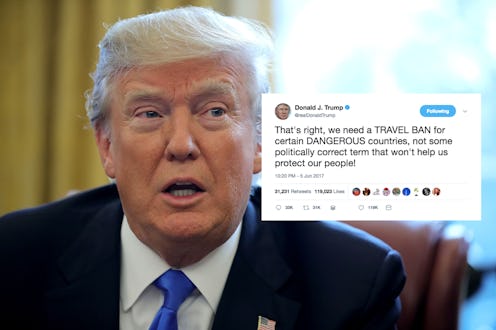News
6 Times Trump Played Himself Because He Thinks Out Loud On Twitter

President Trump's Twitter habits are unconventional, to say the least. He's used the platform to criticize other politicians, immigrants, and even federal judges. But attacking federal judges online isn't the most sensible course of action when those same judges have the power to rule against your administration. See: every time Trump's tweets have been used against him in court.
At the beginning of Trump's presidency, there was some confusion around how seriously the media and the public should take his social media posts. Then former White House press secretary Sean Spicer reminded everyone in June that Trump's tweets are official statements from the president. "Well, the president is the president of the United States, so they're considered official statements by the president of the United States," he said in a press briefing. Spicer dodged a follow-up question about whether Trump was worried that his tweets could be used against him in court.
Indeed, Trump's tweets have come back to bite him in court — and several times at that. On issues ranging from his proposed transgender military ban to Obamacare subsidies, lawyers and judges alike have argued that Trump's online statements show the real intentions behind his decisions. And multiple judges have used the president's own tweets as justification to block his policies, even if that block is only temporary.
That Time He Tweeted Support For DACA
President Trump announced in September that he was ending the Deferred Action for Childhood Arrivals (DACA) program that allowed some undocumented immigrants brought to the U.S. as children to remain in the country and work legally. But a federal judge ruled on Tuesday that the president couldn't nix the program after all.
Judge William Alsup's ruling specifically cited Trump's tweets as proof that ending DACA wasn't in the country's best interest. "We seem to be in the unusual position wherein the ultimate authority over the agency, the Chief Executive, publicly favors the very program the agency has ended," he wrote. The judge then quoted a September tweet from the president where he asked who wants "to throw out good, educated and accomplished young people who have jobs, some serving in the military?"
In another tweet Alsup cited in his decision, Trump asked Congress to approve the very policy he is eliminating. The judge ruled that "for the reasons DACA was instituted, and for the reasons tweeted by President Trump, this order finds that the public interest will be served by DACA’s continuation."
That Time He Confirmed A "Bogus" Investigation
Trump called a dossier on his ties to Russia "bogus," but his tweets suggested to lawyers arguing a freedom of information case that the FBI had looked at the documents. Lawyers for the James Madison Project and Politico argued in a December court filing that when Trump asserted the FBI couldn't verify the claims in the dossier, he actually was verifying that he'd been informed of an existing investigation. CNN later reported that the FBI presented Trump with classified documents in January 2017 alleging Russian operatives tried to compromise him during the 2016 election.
That Second Time He Accidentally Confirmed An Investigation
Lawyers made that same argument in October after Trump asked over Twitter whether Russia, the FBI or the Democrats paid for what he called the "discredited" dossier, according to CNN. The James Madison Project and Politico lawyers seeking a summary of the dossier's contents argued that Trump's repeated mention of the dossier suggests the investigation Trump called "bogus" was very, very real. And by asking who paid for the dossier, Trump may have inadvertently confirmed that he was shown the document, too.
That Time He Jumped The Gun On The Trans Military Ban
When the Trump administration went to court over the proposed transgender military ban, a federal judge temporarily blocked the move, again holding up Trump's tweets for justification. U.S. District Judge Colleen Kollar-Kotelly ruled in October that the president's tweets announcing the ban proved his intention was, in fact, to ban transgender people from serving in the military. Government lawyers asserted that the Pentagon was still studying the issue, arguing that the court couldn’t block the ban because it wasn't in place yet.
According to Kollar-Kotelly, the president's tweets contradicted his own lawyers. "To the extent there is ambiguity about the meaning of the Presidential Memorandum, the best guidance is the president’s own statements regarding his intentions with respect to service by transgender individuals," she wrote in her ruling.
That Time He Threatened Obamacare
A Washington, D.C. appellate court allowed 16 attorneys general to sue the Trump administration in August in an effort to protect their states' Obamacare subsidies from the federal government. Although the court didn't specifically point to the president's tweets, the ruling indirectly referenced Trump's online threats to end the subsidies. The decision said “accumulating public statements by high-level officials” proved the states' lawsuit was timely.
That Time He Revealed His Hand On The Travel Ban
The Trump administration's travel bans have been hotly contested in court ever since the first version was announced just seven days after the president took office. And in June, the 9th Circuit Court of Appeals upheld an injunction that stopped the policy from going into effect, all based on a tweet the president fired off a few days prior to its ruling.
"Indeed, the president recently confirmed his assessment that it is the ‘countries’ that are inherently dangerous, rather than the 180 million individual nationals of those countries," the court said in its official opinion. The ruling also cited Spicer's prior confirmation that the president’s tweets should be read as official statements.
If Trump's tweets are considered official statements, they certainly hold up in a court of law. And based on how many times his posts have been used against him in court, he could benefit from putting the phone down — or at least deleting the Twitter app — from time to time.